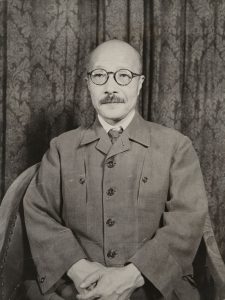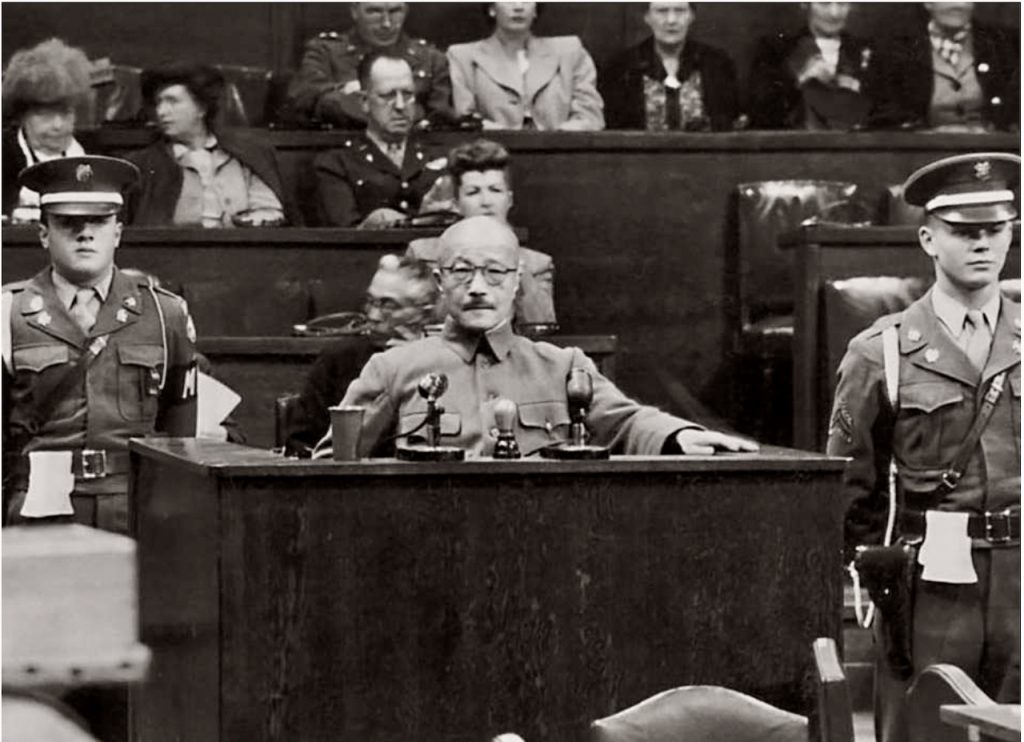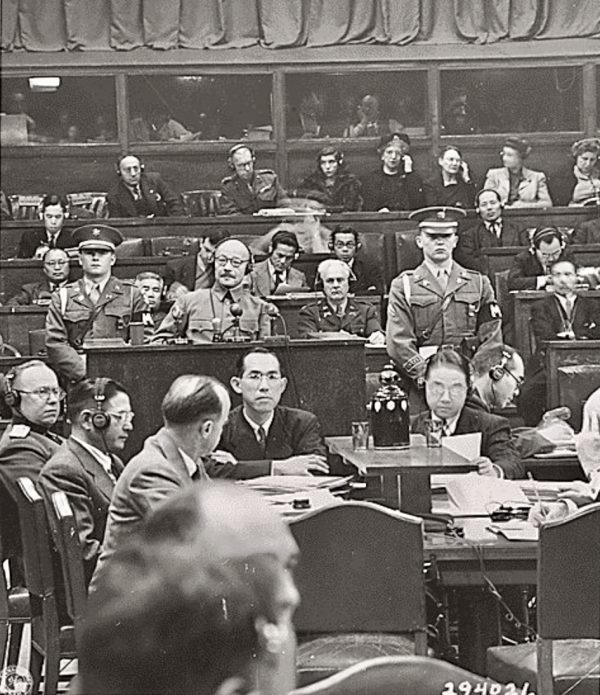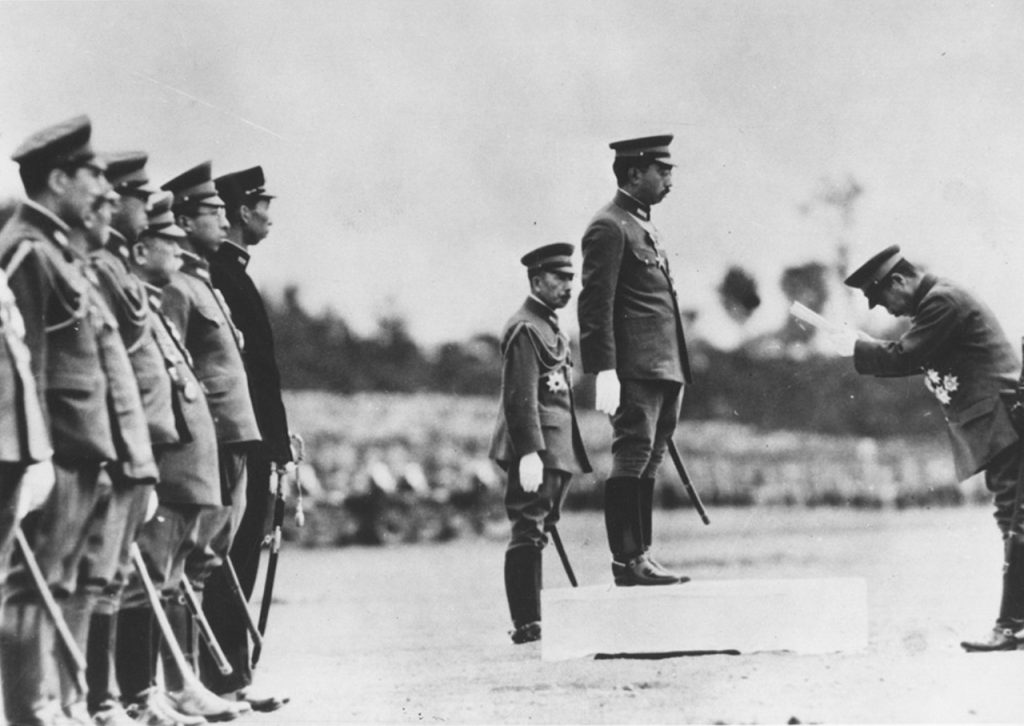Tojo at Tokyo Trials
Who was the real leader of Japan?
When his arrest was ordered in September, Hideki Tojo tried to commit suicide by shooting himself and failed. Another version of this incident reads ‘a month after then-Emperor Hirohito announced Japan’s defeat to a stunned nation, Tojo shot himself in a failed suicide attempt as he was about to be arrested at his modest Tokyo home.’
General Tojo was found guilty and sentenced to hang 23 Dec 1948.
Tojo was guilty of war crimes, but who was the dictator?
Dictators never resign their leadership roles.
Who was the divine leader?
After 14 years of war, Japan lay in ruins.
Nearly two million Japanese lay dead



Below: Tojo told a different story to Emperor Horohito.


Above: Tojo, his wife and granddaughter (this granddaughter later in life aged 73 years, in 2007 ran unsuccessfully for a seat in parliament.
“I was born as Hideki Tojo’s granddaughter, and as a Japanese national. I cannot see Japan go on like this, with no confidence or pride,” Tojo told The Associated Press. “I do not think the war dead gave their lives for a country like this.” She died in 2013.)
Hideki Tojo was born into a military family in Tokyo 1888. His father was from a lowly samurai family, turned army officer and his mother was the daughter of a Buddhist priest. A respectable but poor family. Tojo’s education was typical of Meiji era (1868 – 1912).
The Meiji educational system was to train boys to be soldiers as adults. The message was relentlessly drilled into Japanese students that war was the most beautiful thing in the entire world. (Not only) was the Emperor a living god but the greatest honour for a Japanese man was to die for the Emperor!
Tojo was a graduate of the Imperial Military Academy and the Military Staff College. He was first a soldier and then a statesman but perhaps that changed later in his life! Tojo was Minister for War 1940 – 1941. Then became Japan’s Prime Minister until 1944.
Tojo was shrewd at bureaucratic infighting which was rampant (the army and the navy hated each other, etc) and was Hirohito’s way of running his imperialist palace. Everybody fighting for his favour. Emperor Showa (his Japanese title) always had the final say in the whole imperialist government.
Known within the army as ‘Razor’ Tojo he moved quickly through the ranks becoming a General in 1935. Always a strong ultra nationalist Tojo was an esteemed administrator, skilful field commander and stern disciplinarian.
Like almost all Japanese officers at the time, Tojo routinely slapped the faces of the men under his command when giving orders, saying that face-slapping was a “means of training” men who came from families that were not part of the samurai caste, and for whom bushido was not second nature.
He became head of the Police Garrison Force in Manchuria prior to becoming Kwantung Army’s Chief of Staff in 1937. In July of that year he played a key role in opening hostilities against China. His only combat experience was later that year when he led two brigades on operations in Inner Mongolia against the Chinese.
In 1938 Tojo returned to Tokyo as Army Vice Minister, then became Army Minister in 1940 and pushed for an alliance with Germany and Italy (he had served as Japan’s Military Attache to Germany from about 1920-1922). Tojo assumed several further positions including that of Chief of Staff of the Imperial Army and Prime Minister (1941-1944).

The successful Allied invasion of the Mariana Islands so weakened his government, that he was removed as chief of staff on July 16, 1944, and on 18 July 1944 he and his entire cabinet announced their resignation.
The location of the the remains of Tojo have remained a mystery for decades, that is until recently.
Declassified U.S. military documents show the cremated ashes of Tojo and six others who were executed with him, were scattered from a U.S. Army aircraft over the Pacific Ocean about 30 miles east of Yokohama, Japan’s second-largest city, south of Tokyo.
At the time it was a highly secretive mission undertaken by the Americans who did not want ultra-nationalists glorifying them as martyrs. Understandably, it had been a long and costly war beginning with Pearl Harbour.
Below: Hirohito standing tall while Tojo bows. This is 1941 just a few days prior to Pear Harbour.


The Showa Emperor Hirohito as head of the Imperial General Headquarters in 1943. Navy officers are seated left while Army officers are seated right.


